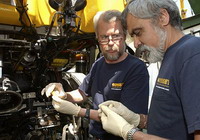Odyssey Marine Explorers find ship full of treasure
Florida-based Odyssey Marine Exploration created an international sensation Friday by announcing the recovery of more than 500,000 colonial-era silver and gold coins from an unspecified Atlantic Ocean shipwreck possibly worth $500 million (371.9 million EUR).

Odyssey added to the intrigue by withholding details about the shipwreck, where it was found or even what kind of coins they had hauled back to the United States.
"We are overwhelmed by the worldwide interest in this project, and it reinforces our belief that shipwreck exploration hits a nerve with the public. I wasn't prepared for the response," Odyssey co-founder Greg Stemm said from Los Angeles, where he was meeting with Disney representatives about possible TV and movie projects.
In England, it generated press reports that Odyssey had salvaged the wreck of the long-sought British vessel Merchant Royal, which sank in bad weather off England in 1641.
In Spain, the government said it was "suspicious" of Odyssey's find, given that it recently granted permission to the company to hunt for the wreck of the HMS Sussex in the Mediterranean Sea. Culture Minister Carmen Calvo said his nation will claim the loot if it turns out to be Spanish or was removed from Spanish waters
Odyssey stated definitively Monday that its so-called Black Swan project that yielded the riches was not the Sussex, which historians believed was laden with gold coins when it sank off Gibraltar in 1694.
Regarding the Merchant Royal, Odyssey was not confirming or denying anything.
"The 'Black Swan' bears characteristics of one shipwreck in particular, but some of the evidence gathered to date is inconsistent with our research, so we want to be sure of the identity before we announce it," the company said in a statement.
A federal judge in Tampa granted Odyssey exclusive salvage rights last week to an unspecified shipwreck site near the English Channel, about 40 miles (64.37 kilometers) off the southwestern tip of England.
That is the area where historians say the Merchant Royal went down laden with riches in 1641, and salvagers have been hunting it for years. British newspapers reported Saturday that shipping records and witnesses indicate Odyssey's ships were working in the area last year, likely looking for the Merchant Royal.
Historians say the Merchant Royal took on water and sank while transporting loot from Spain to Belgium to pay the Spanish army stationed there at the time.
The Daily Mail in London asserted that the Merchant Royal treasure was "stolen by Americans," who secretly spirited it back to the United States to keep Britain from making a claim.
Odyssey said again Monday that their recovery conformed with salvage laws, the site was beyond the territorial waters or legal jurisdiction of any country, and the coins were legally exported to the United States.
"We do believe that most shipwrecks that we recover, including the 'Black Swan,' will likely result in claims by other parties," the company said. "Many will be spurious claims, but we anticipate that there might be some legitimate ones as well. ... It is the opinion of our legal counsel that even if a claim is deemed to be legitimate by the courts, Odyssey should still receive title to a significant majority of the recovered goods."
Meanwhile, Odyssey and the Walt Disney Co. are reveling in a happy coincidence - news of the deep-sea explorers' good fortune hit the media just as the hype cranked up for the new Disney movie "Pirates of the Caribbean: At World's End".
"It's truly serendipitous that this happened just prior to this weekend's release of 'Pirates of the Caribbean: At World's End,' as we began our film discussions with Odyssey about a year ago, long before they knew about the ship," Disney spokeswoman Cherise McVicar said.
Working with Odyssey, McVicar said, "has given additional authenticity to our film promotions."
Subscribe to Pravda.Ru Telegram channel, Facebook, RSS!





